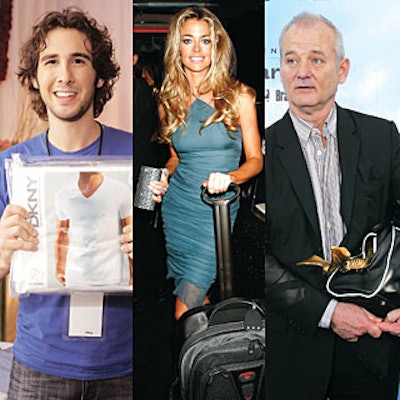
High-end retailers such as Armani and Harry Winston move truckloads of luxury goods thanks to savvy product placement on the red carpet. And in recent years, swag ops for A-list celebrities at the biggest award shows have been mushrooming, reportedly approaching values of $100,000 a pop, an amount that hasn’t escaped the notice of the Internal Revenue Service. In a much-trumpeted move in August, the I.R.S. clarified the tax law governing such gifts and announced an outreach campaign to encourage givers and celebrities to report them as taxable income.
The department said that celebrity freebies don’t qualify as gifts—which aren’t normally taxable—“because the organizations and merchants who participate in giving the gift bags do not do so solely out of affection, respect, or similar impulses for the recipients of the gift bags,” according to the department’s Web site. The government considers gift bags taxable income because they’re quid pro quo—merchants lavish the stars with their goods in the hope of boosting sales.
“There’s no special red-carpet tax loophole for the stars,” I.R.S. commissioner Mark W. Everson said when the campaign was announced. “Whether you’re popping the popcorn, sitting in the audience, or starring on the big screen, you need to respect the law and pay your taxes.”
That doesn’t mean the I.R.S. is sending squads of G-men to award shows. The agency said it isn’t stepping up enforcement efforts but is relying on voluntary compliance. Of course, there’s always the chance that “these issues can arise during individual examinations of tax returns,” as the department notes ominously.
What does it all mean for event planners? That depends. The sponsors of the highest-profile award shows—the motion picture and television academies—are taking care to stick to the letter of the law. The Academy of Motion Picture Arts and Sciences says its gift baskets were well established by the early 1970’s as a way to thank its presenters, who are unpaid, and its performers, who are paid union scale. (For the winners, the statuette is considered thanks enough.) Nonetheless, the academy reached an undisclosed settlement with the I.R.S. over tax liability for gifts given through 2005. For last year’s goodies, both academies sent recipients letters advising them of their tax obligation and the fair market value of the gifts. For the 2007 Oscars in February, the academy is dispensing with gifts altogether.
“Our board voted in April to discontinue the practice,” said academy spokeswoman Leslie Unger. “The desire to express gratitude to those people still exists, but we may try to figure out another way to do it. Doing it in a way that carried a tax
burden didn’t seem appropriate to us anymore.”
The Academy of Television Arts and Sciences hasn’t yet decided how to handle the issue for the 2007 Emmy awards, to be held in September, a spokeswoman said.
For most other event planners, the gift bag tax won't present a problem—1099 tax-reporting forms are required only for goods worth at least $600, and most goodie bags don’t approach that.
“No one cares about the hundred-dollar bouquet of flowers,” said Los Angeles tax attorney Barry Guterman. “It becomes an issue when it’s such a substantial amount it can’t be ignored, when it’s publicized as it is with every television station giving out the list” of gifts surrounding the award shows.
For event planners dealing with higher-priced freebies, the wicket is considerably stickier, say industry and tax professionals. Take the simplest question first: Who’s liable? The recipient has to report the gift as income, and the payer has to report the payment of the award to the recipient. If the payer doesn’t report it, he or she can be hit with a penalty. Who’s the payer? Whoever distributes the goods. In the case of the Oscar gift baskets, it was the academy. But if an event planner is the link between the merchant and the recipient, it’s the event planner.“If the vendors give all of the merchandise to an event planner, and you put all the gifts together and have a $5,000 gift bag, and it’s the event planner giving out the bag, now the event planner is going to be subject to the reporting,” Guterman said. “My advice is, the event planner should try to stay out of the distribution process.”
Guterman recommends that goods be distributed in gift suites where possible. That way, businesses are doling out the merch directly, making them responsible for any reporting instead of the host or planner coordinating the suite. And if a particular merchant’s goods are worth less than $600, it won’t have to report the gift either. (Corporate presents worth $600 or more given to mere mortals at, say, holiday time need not be reported, because the gift-giver is motivated by admiration, Guterman said. “No one is giving me a business gift so that I’ll reduce my hourly rate next year,” he said.)
Some critics in the events industry say the I.R.S. campaign has only confused matters. In an open letter on his Web site, Lash Fary, founder of Distinctive Assets, which gave out wine club and gym memberships for the Emmys, said it was difficult to tell celebrities what their gifts were worth because some items are unique and hard to put a price on. Guterman, too, noted that an item’s “fair market value” is open to interpretation. Was the Oscar gift bag that George Clooney so famously donated to charity worth the $100,000 touted in the press or the $42,000 it brought on eBay?
Backstage Creations gave celebrities estimates of the fair market value of the gifts that the company handed out at the recent Teen Choice awards, but president Karen Wood said the method for determining value was under review. “It’s pretty complicated,” she said. “We are currently talking to attorneys about how to handle everything.”
Companies like Backstage and GBK Productions also offer stars opportunities to alleviate their tax burden by inviting charities to their gift lounges, where they can make face-toface appeals for stars’ time, gifts, and money. But veteran publicist Howard Bragman of Fifteen Minutes said he hasn’t noticed much change on the Hollywood gifting landscape. “I don’t think gift bags will go away,” he said. “But I think this will force us to be more creative about the way we do it.”
—Irene Lacher



















